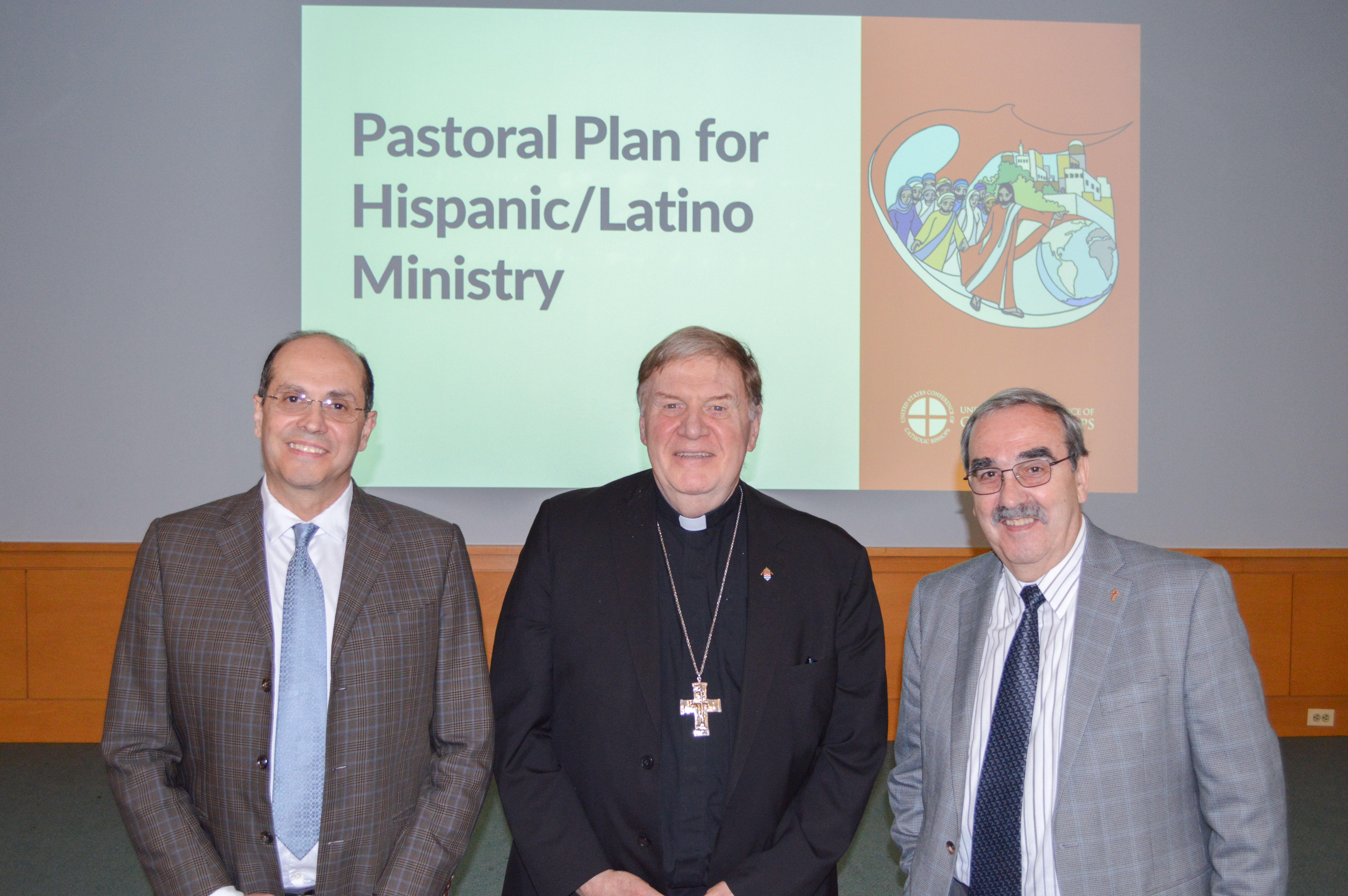Plan builds upon Hispanic/Latino growth
Building on Hispanic/Latino growth, the U.S. Conference of Catholic Bishops (USCCB) approved a strategic plan titled “Missionary Disciples Going Forth with Joy – National Plan for Hispanic/Latino Ministry” last year. On May 23, the USCCB’s assistant director for Hispanic Ministry, Alejandro Aguilera Titus, presented the plan to archdiocesan employees and clergy in informational sessions held at the Archdiocesan Pastoral Center in Newark.
During the sessions, Titus explained how the plan calls for a synodal Church that is more welcoming, evangelizing, and missionary at all levels. He said this is crucial because as the Hispanic community has become increasingly involved with local parishes, it has come to view churches as second homes.
“They are looking for ways to encounter Christ in every way, every day,” Titus said, adding that Hispanic Catholics want “to accompany each other and be part of a Church that speaks up against injustices. And there is a want for everyone to be informed, a need to know the Bible and to be nourished and transformed by the Eucharist.”
According to the USCCB’s plan, the Hispanic community seeks to:
- achieve the vision of fostering encounters with the living Jesus Christ by reaching out to the peripheries;
- create a culture of encounter, accompanying one another;
- with a prophetic voice, get involved as a promoter and example of justice and mercy;
- inspire hope with the Word of God, providing integral formation;
- be nourished and transformed by the Eucharist and;
- be sent forth to joyfully proclaim the Good News of the Gospel in our common home.

To do this, according to the national plan, the USCCB’s Hispanic Ministry needs direct access to Church officers; a dedicated budget to conduct projects, initiatives, or programs in which the Hispanic Ministry is the lead agent; a Pastoral de Conjunto Approach (co-responsible collaboration and coordination) among staff from various diocesan offices; and help in forming and training pastoral leaders.
Finally, the plan states pastoral approaches should include the promotion of ecclesial integration and inclusion by identifying what is needed to increase the level of welcoming, belonging, and co-responsibility among all the faithful, as described in Best Practices for Shared Parishes.
The USCCB’s national plan was a result of V Encuentro, which was most recently held from 2017 –2020. The Encuentro process has been the catalyst for developing ministries among Hispanics/Latinos over the past 50 years, having been held five times. Cardinal Joseph Tobin C.Ss.R., Archbishop of Newark, who attended the talk, said Hispanic Catholic communities were prepared for the Church’s recent Synod on Synodality due to participation in Encuentro, which promotes an openness to relationship and listening.
About 40% of parishes in the Archdiocese of Newark celebrate Masses in Spanish. Those churches, however, do more than host Masses. They have intwined the Hispanic Catholic population into the Church in what is termed a “shared parish.”
The Archdiocese of Newark mirrors dioceses across the country where Hispanic/Latino ministries have flourished over the past four decades. Fifty-two percent of all Catholics are Hispanic/Latino. As the Hispanic and Latino population has grown throughout the U.S. — in New Jersey by almost 40% from 2000 to 2010 — 85 parishes out of 212 within the Archdiocese Newark are now “shared parishes.”


Where the early 20th century gave way to churches dedicated to a particular immigrant population such as Italian or Polish, today’s church spaces are shared. The term “shared parishes” describes parish communities in which two or more languages or cultural contexts are an integral part of the ministerial life and mission of a particular parish. Sunday liturgy is celebrated in English and another language and may include the cultural and spiritual context of that community. The distinct ethnic/cultural communities share together in the life and mission of one parish community. Religious education, youth ministry, and other ministries are also offered in different languages, but they are organized and coordinated under one vision for religious education, youth ministry, and so on, according to the “Best Practices for Shared Parishes.”
Deacon Asterio Velasco, director of the archdiocesan Hispanic Ministry, said over the decades, the Archdiocese of Newark has done an excellent job matching the growth of the Hispanic/ Latino community with the number of shared parishes. But he said more are needed to meet the continued growth.
For many years, the USCCB has recognized the large contribution Hispanics bring to the Church in the United States, Deacon Velasco said.
“They ‘are a blessing for the Church and for our country’ it says at the very beginning of this new document. With the great love for the Church that characterizes them, with their long history in the country and with the values that they carry with them, they certainly have much to contribute to this beautiful mosaic that is the multicultural Church in which we live,” Deacon Velasco said. “The bishops recognize the growing importance of the Hispanic community in the present and the even greater importance projected for the future. That is the reason for the call made in this Plan to the entire Church to care for this important segment of our ecclesial reality in the United States.”
As of 2023, 43% of Hispanic adults identified as Catholic. Latinos are also twice as likely as U.S. adults overall to identify as Catholic.
More than half of Hispanic Catholics report engaging in faith formation on a weekly basis. Sixty percent report that they take the Eucharist more than once a week.
“The challenge is to have more Spanish-speaking priests,” Deacon Velasco.
Featured image: USCCB’s assistant director for Hispanic Ministry, Alejandro Aguilera Titus, Cardinal Joseph Tobin, and Deacon Asterio Velasco, director of the archdiocesan Hispanic Ministry, after the presentation. ( Shania Mosquera)


